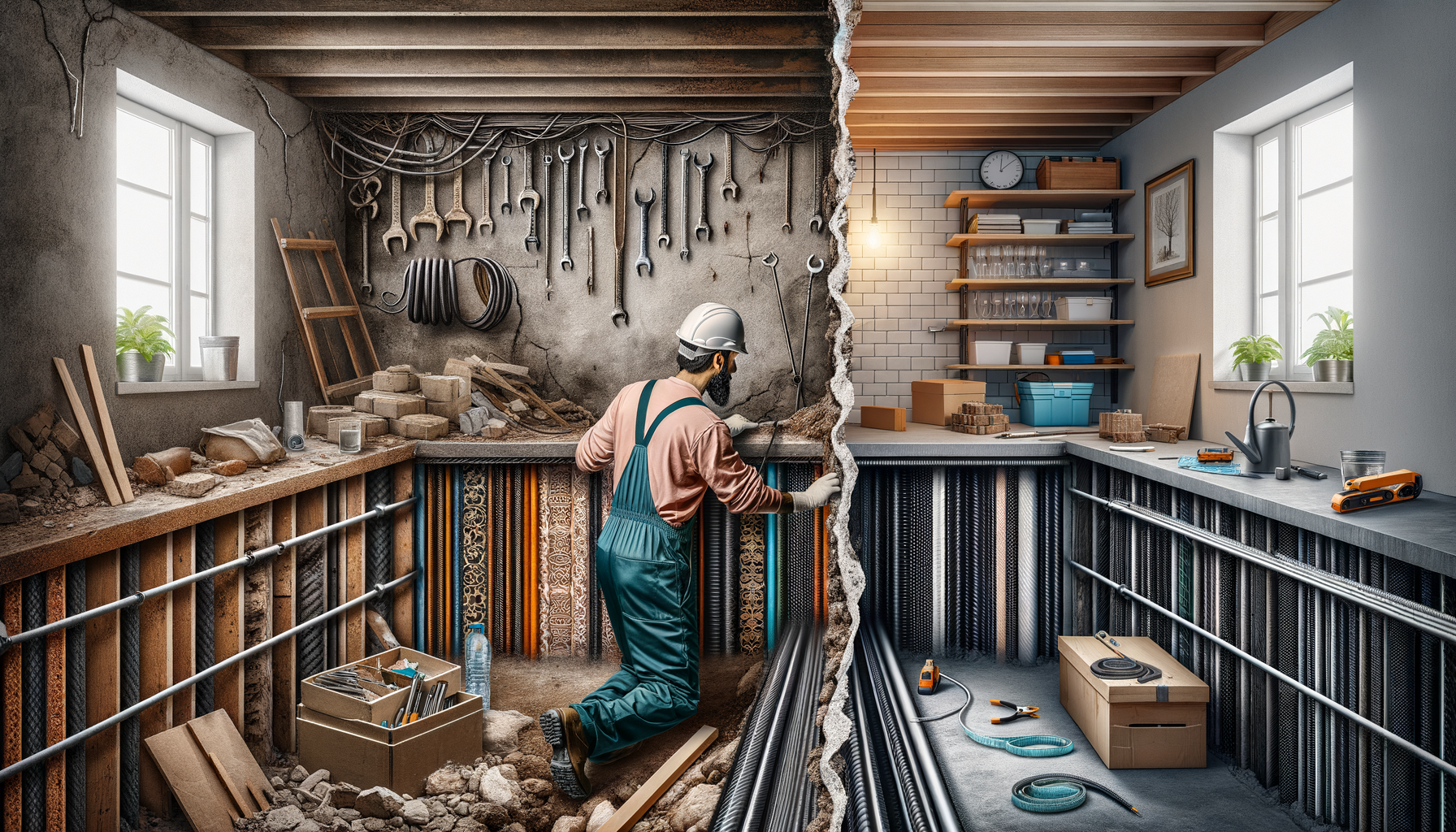What is Carbon Fiber?
Carbon fiber is a super strong and light material made from little strands of carbon. When mixed with plastic, it makes a very tough material called carbon fiber-reinforced polymer (CFRP). This material is used in lots of different things, like airplanes and sports gear.
Why Use Carbon Fiber for Basement Walls?
Old ways like using steel beams and wall anchors to fix basement walls can be messy and expensive. Carbon fiber is a newer and easier choice:
- Less Messy: No need to dig up your yard or knock down walls.
- Quick Fix: Usually done in a day or two.
- Cheaper Long-Term: Costs less to keep up over time.
When Do Your Basement Walls Need Repair?
Cracks in the Wall
If you see cracks going side to side, up and down, or in a zigzag pattern, you might need to fix your basement walls. Side-to-side cracks can show there’s too much pressure from water or soil outside. Up and down or zigzag cracks can mean the ground below is shifting.
Bulging Walls
If your walls are curving inward, this is called bowing. This can happen because of pressure from soil or water outside. It can make your basement less safe.
Water Leaks
If you see wet spots, mold, or puddles of water, you have a leak. Water problems can damage your walls and cause mold, which is bad for your health.
Benefits of Carbon Fiber Wall Repair
Stronger Walls
Carbon fiber straps help spread out pressure, making weak spots stronger and stopping further movement. This makes your basement walls much stronger.
Less Disruption
Fixing walls with carbon fiber doesn’t mess up your home with big digs or demolitions.
Affordable
Carbon fiber repairs don’t cost as much to start with and are durable, meaning you save money later on with fewer fixes needed.
Steps to Fix Basement Walls with Carbon Fiber
Checking the Walls
A professional will look at your walls and tell you what needs to be done.
Getting Ready
The walls need to be cleaned well. Any paint, dust, or dirt must be removed so the carbon fiber straps will stick properly.
Putting on the Straps
The carbon fiber straps are glued to the wall with a special epoxy glue. They are placed in the weak spots to make the wall stronger.
Letting It Dry
The epoxy glue needs about one to two days to dry completely. After this, your wall will be much stronger.
Doing It Yourself vs. Hiring a Pro
DIY
Some people might want to try fixing the wall themselves. You need to clean the surface, put on the epoxy, and attach the straps. But if it’s not done right, the fix might not last, and it could cost more to fix later.
Getting a Professional
Hiring a professional ensures the job is done right. Look for Canadian contractors with good reviews and proper certifications.
Keeping Your Walls in Good Shape
Regular Check-Ups
Check your walls regularly for new cracks or water leaks to make sure everything is still strong.
Fixing Water Problems
Make sure your basement has good drainage, and your gutters and downspouts are working to keep water away from the foundation.
Small Fixes
If you see small cracks, fix them right away to stop them from getting worse. A simple sealant can often do the trick.
Real-Life Success Stories
Many Canadian homeowners have used carbon fiber to fix their basement walls. For example, in Calgary, a home with a badly curved wall was fixed in just two days with little mess.
Final Thoughts
Carbon Fiber: A Smart Choice
Using carbon fiber to fix basement walls is a strong, affordable choice. It’s easy to use and has long-lasting benefits, making it a great option for homeowners in Canada.
Take Action
If you think your basement walls need fixing, act fast. Check your walls, talk to a professional, and consider using carbon fiber to protect your home.
This guide helps Canadian homeowners understand why and how to use carbon fiber to fix basement walls. By knowing the benefits and steps, you can make the best choice to keep your home safe and strong.


Leave a Reply